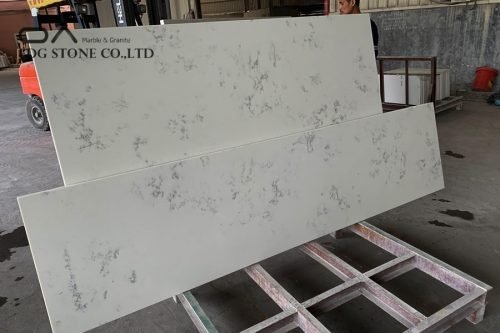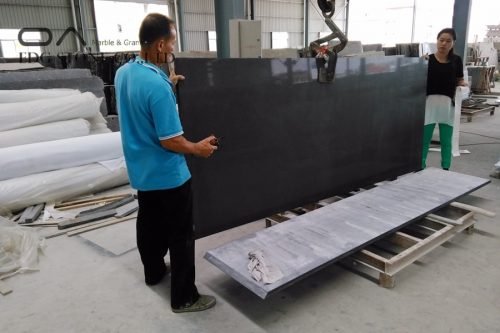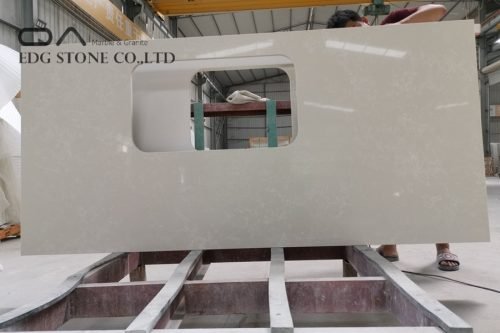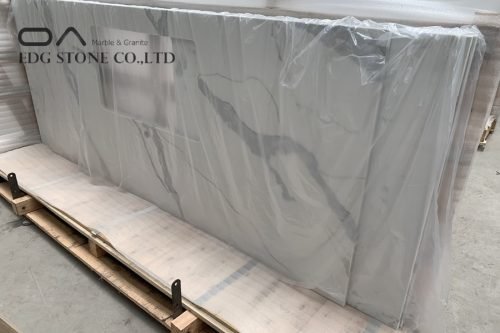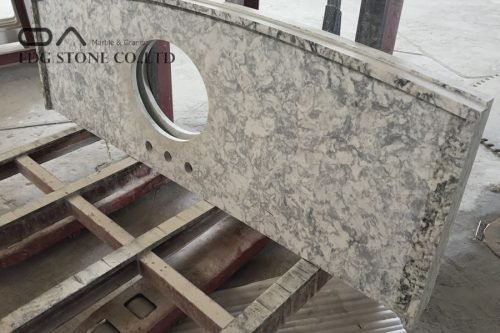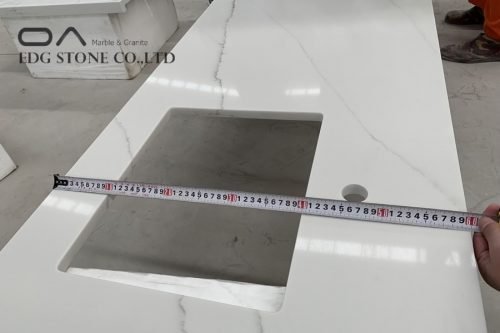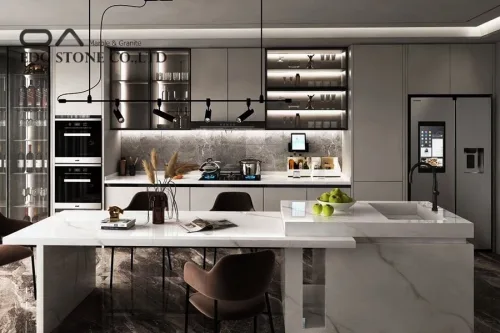
 The quartz island countertop made of engineered quartz (not to be confused with Quartzite, another appealing natural stone used as counters) is a manmade product created mostly from natural materials. It’s made of 90% to 94% ground quartz and 6% to 10% resins and pigments that are combined into durable and nonporous slabs. The strength of quartz, even in a manufactured form, makes it naturally resistant to abrasion, scratches, dents, and even acids without the need for sealants. And the environmental impact of manufactured quartz is low: Quartz is an abundant material and the finished product is nontoxic and nonallergenic and will last a lifetime, reducing the need for replacement.
The quartz island countertop made of engineered quartz (not to be confused with Quartzite, another appealing natural stone used as counters) is a manmade product created mostly from natural materials. It’s made of 90% to 94% ground quartz and 6% to 10% resins and pigments that are combined into durable and nonporous slabs. The strength of quartz, even in a manufactured form, makes it naturally resistant to abrasion, scratches, dents, and even acids without the need for sealants. And the environmental impact of manufactured quartz is low: Quartz is an abundant material and the finished product is nontoxic and nonallergenic and will last a lifetime, reducing the need for replacement. The quartz kitchen countertops made of engineered quartz (not to be confused with Quartzite, another appealing natural stone used as counters) is a manmade product created mostly from natural materials. It’s made of 90% to 94% ground quartz and 6% to 10% resins and pigments that are combined into durable and nonporous slabs. The strength of quartz, even in a manufactured form, makes it naturally resistant to abrasion, scratches, dents, and even acids without the need for sealants. And the environmental impact of manufactured quartz is low: Quartz is an abundant material and the finished product is nontoxic and nonallergenic and will last a lifetime, reducing the need for replacement.
The quartz kitchen countertops made of engineered quartz (not to be confused with Quartzite, another appealing natural stone used as counters) is a manmade product created mostly from natural materials. It’s made of 90% to 94% ground quartz and 6% to 10% resins and pigments that are combined into durable and nonporous slabs. The strength of quartz, even in a manufactured form, makes it naturally resistant to abrasion, scratches, dents, and even acids without the need for sealants. And the environmental impact of manufactured quartz is low: Quartz is an abundant material and the finished product is nontoxic and nonallergenic and will last a lifetime, reducing the need for replacement. The quartz kitchen countertops made of engineered quartz (not to be confused with Quartzite, another appealing natural stone used as counters) is a manmade product created mostly from natural materials. It’s made of 90% to 94% ground quartz and 6% to 10% resins and pigments that are combined into durable and nonporous slabs. The strength of quartz, even in a manufactured form, makes it naturally resistant to abrasion, scratches, dents, and even acids without the need for sealants. And the environmental impact of manufactured quartz is low: Quartz is an abundant material and the finished product is nontoxic and nonallergenic and will last a lifetime, reducing the need for replacement.
The quartz kitchen countertops made of engineered quartz (not to be confused with Quartzite, another appealing natural stone used as counters) is a manmade product created mostly from natural materials. It’s made of 90% to 94% ground quartz and 6% to 10% resins and pigments that are combined into durable and nonporous slabs. The strength of quartz, even in a manufactured form, makes it naturally resistant to abrasion, scratches, dents, and even acids without the need for sealants. And the environmental impact of manufactured quartz is low: Quartz is an abundant material and the finished product is nontoxic and nonallergenic and will last a lifetime, reducing the need for replacement. The quartz kitchen countertops cost made of engineered quartz (not to be confused with Quartzite, another appealing natural stone used as counters) is a manmade product created mostly from natural materials. It’s made of 90% to 94% ground quartz and 6% to 10% resins and pigments that are combined into durable and nonporous slabs. The strength of quartz, even in a manufactured form, makes it naturally resistant to abrasion, scratches, dents, and even acids without the need for sealants. And the environmental impact of manufactured quartz is low: Quartz is an abundant material and the finished product is nontoxic and nonallergenic and will last a lifetime, reducing the need for replacement.
The quartz kitchen countertops cost made of engineered quartz (not to be confused with Quartzite, another appealing natural stone used as counters) is a manmade product created mostly from natural materials. It’s made of 90% to 94% ground quartz and 6% to 10% resins and pigments that are combined into durable and nonporous slabs. The strength of quartz, even in a manufactured form, makes it naturally resistant to abrasion, scratches, dents, and even acids without the need for sealants. And the environmental impact of manufactured quartz is low: Quartz is an abundant material and the finished product is nontoxic and nonallergenic and will last a lifetime, reducing the need for replacement. The Quartz kitchen countertops near me made of engineered quartz (not to be confused with Quartzite, another appealing natural stone used as counters) is a manmade product created mostly from natural materials. It’s made of 90% to 94% ground quartz and 6% to 10% resins and pigments that are combined into durable and nonporous slabs. The strength of quartz, even in a manufactured form, makes it naturally resistant to abrasion, scratches, dents, and even acids without the need for sealants. And the environmental impact of manufactured quartz is low: Quartz is an abundant material and the finished product is nontoxic and nonallergenic and will last a lifetime, reducing the need for replacement.
The Quartz kitchen countertops near me made of engineered quartz (not to be confused with Quartzite, another appealing natural stone used as counters) is a manmade product created mostly from natural materials. It’s made of 90% to 94% ground quartz and 6% to 10% resins and pigments that are combined into durable and nonporous slabs. The strength of quartz, even in a manufactured form, makes it naturally resistant to abrasion, scratches, dents, and even acids without the need for sealants. And the environmental impact of manufactured quartz is low: Quartz is an abundant material and the finished product is nontoxic and nonallergenic and will last a lifetime, reducing the need for replacement. The quartz kitchen top made of engineered quartz (not to be confused with Quartzite, another appealing natural stone used as counters) is a manmade product created mostly from natural materials. It’s made of 90% to 94% ground quartz and 6% to 10% resins and pigments that are combined into durable and nonporous slabs. The strength of quartz, even in a manufactured form, makes it naturally resistant to abrasion, scratches, dents, and even acids without the need for sealants. And the environmental impact of manufactured quartz is low: Quartz is an abundant material and the finished product is nontoxic and nonallergenic and will last a lifetime, reducing the need for replacement.
The quartz kitchen top made of engineered quartz (not to be confused with Quartzite, another appealing natural stone used as counters) is a manmade product created mostly from natural materials. It’s made of 90% to 94% ground quartz and 6% to 10% resins and pigments that are combined into durable and nonporous slabs. The strength of quartz, even in a manufactured form, makes it naturally resistant to abrasion, scratches, dents, and even acids without the need for sealants. And the environmental impact of manufactured quartz is low: Quartz is an abundant material and the finished product is nontoxic and nonallergenic and will last a lifetime, reducing the need for replacement. The quartz kitchen tops prices cheaply made of engineered quartz (not to be confused with Quartzite, another appealing natural stone used as counters) is a manmade product created mostly from natural materials. It’s made of 90% to 94% ground quartz and 6% to 10% resins and pigments that are combined into durable and nonporous slabs. The strength of quartz, even in a manufactured form, makes it naturally resistant to abrasion, scratches, dents, and even acids without the need for sealants. And the environmental impact of manufactured quartz is low: Quartz is an abundant material and the finished product is nontoxic and nonallergenic and will last a lifetime, reducing the need for replacement.
The quartz kitchen tops prices cheaply made of engineered quartz (not to be confused with Quartzite, another appealing natural stone used as counters) is a manmade product created mostly from natural materials. It’s made of 90% to 94% ground quartz and 6% to 10% resins and pigments that are combined into durable and nonporous slabs. The strength of quartz, even in a manufactured form, makes it naturally resistant to abrasion, scratches, dents, and even acids without the need for sealants. And the environmental impact of manufactured quartz is low: Quartz is an abundant material and the finished product is nontoxic and nonallergenic and will last a lifetime, reducing the need for replacement. The Quartz kitchen worktops near me made of engineered quartz (not to be confused with Quartzite, another appealing natural stone used as counters) is a manmade product created mostly from natural materials. It’s made of 90% to 94% ground quartz and 6% to 10% resins and pigments that are combined into durable and nonporous slabs. The strength of quartz, even in a manufactured form, makes it naturally resistant to abrasion, scratches, dents, and even acids without the need for sealants. And the environmental impact of manufactured quartz is low: Quartz is an abundant material and the finished product is nontoxic and nonallergenic and will last a lifetime, reducing the need for replacement.
The Quartz kitchen worktops near me made of engineered quartz (not to be confused with Quartzite, another appealing natural stone used as counters) is a manmade product created mostly from natural materials. It’s made of 90% to 94% ground quartz and 6% to 10% resins and pigments that are combined into durable and nonporous slabs. The strength of quartz, even in a manufactured form, makes it naturally resistant to abrasion, scratches, dents, and even acids without the need for sealants. And the environmental impact of manufactured quartz is low: Quartz is an abundant material and the finished product is nontoxic and nonallergenic and will last a lifetime, reducing the need for replacement. The quartz porcelain countertops - What is a porcelain countertop Before understanding the shortcomings of a porcelain countertop, let's first understand what a porcelain countertop is? The porcelain is made of natural stone and inorganic clay through a special process, using advanced vacuum extrusion equipment and a fully automatic closed computer It is a new type of ceramic sheet fired in a temperature-controlled roller kiln at 1200 degrees. The existing maximum size is 3600*1200mm, and it weighs only 7kg per square meter. Although the thickness of the porcelain countertop is thin, it is very strong, not easy to scratch, and it can cut vegetables directly on it. 1. Light: The average weight of traditional tiles is 23-27kgs/m2, while the average weight of ultra-thin porcelain is only 7kgs/m2.
The quartz porcelain countertops - What is a porcelain countertop Before understanding the shortcomings of a porcelain countertop, let's first understand what a porcelain countertop is? The porcelain is made of natural stone and inorganic clay through a special process, using advanced vacuum extrusion equipment and a fully automatic closed computer It is a new type of ceramic sheet fired in a temperature-controlled roller kiln at 1200 degrees. The existing maximum size is 3600*1200mm, and it weighs only 7kg per square meter. Although the thickness of the porcelain countertop is thin, it is very strong, not easy to scratch, and it can cut vegetables directly on it. 1. Light: The average weight of traditional tiles is 23-27kgs/m2, while the average weight of ultra-thin porcelain is only 7kgs/m2.
